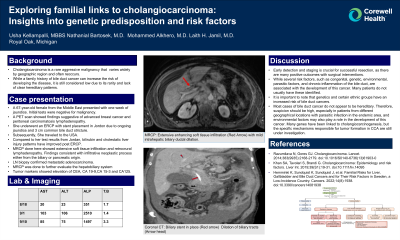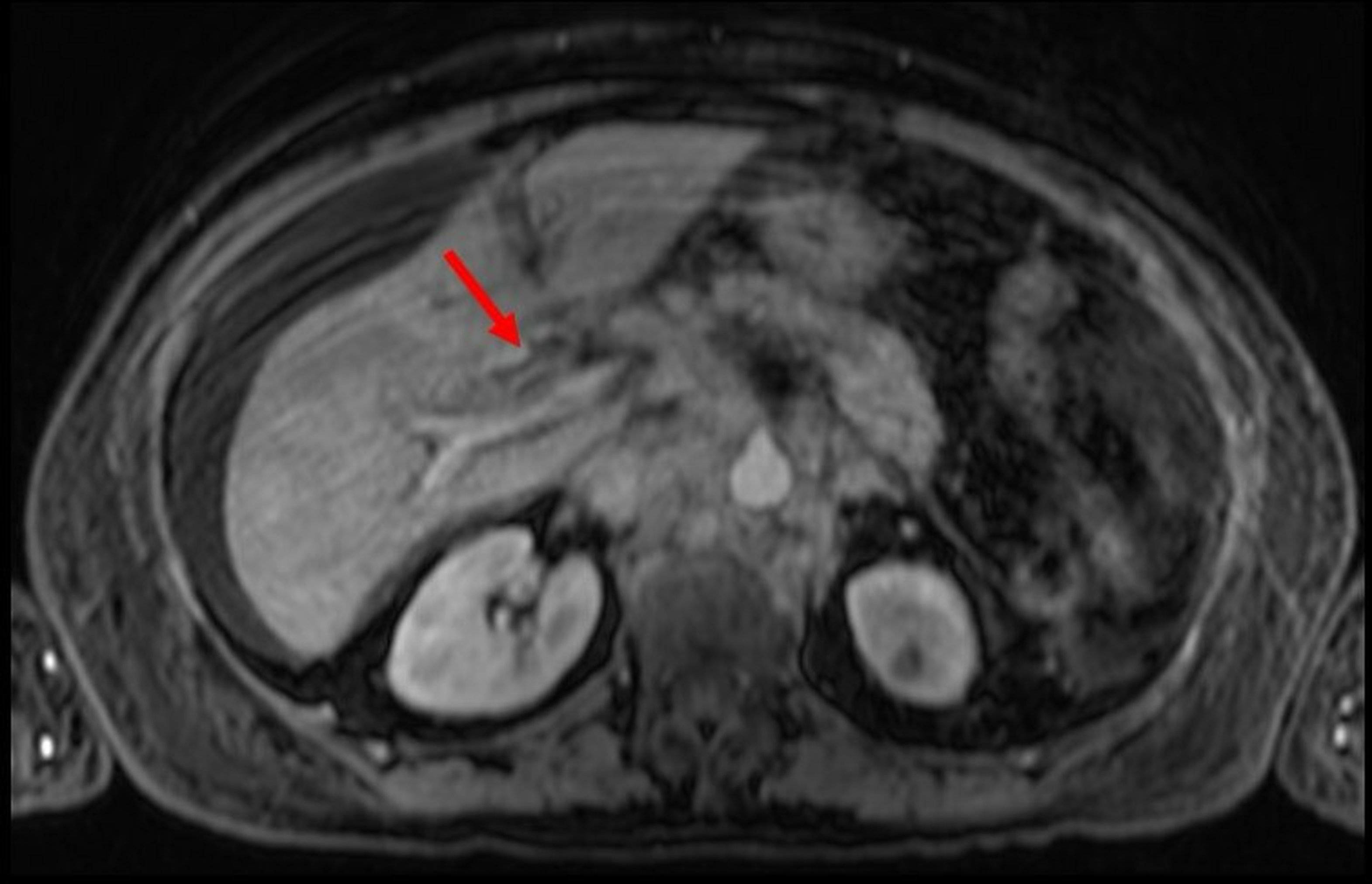Tuesday Poster Session
Category: Biliary/Pancreas
P3570 - Exploring Familial Links to Cholangiocarcinoma: Insights Into Genetic Predisposition and Risk Factors
Tuesday, October 29, 2024
10:30 AM - 4:00 PM ET
Location: Exhibit Hall E

Has Audio

Usha Kellampalli, MBBS
Corewell Health
troy, MI
Presenting Author(s)
Usha Kellampalli, MBBS1, Nathanial Bartosek, MD2, Mohammed Alkhero, MD1, Laith H. Jamil, MD3
1Corewell Health, Royal Oak, MI; 2Beaumont Health, Royal Oak, MI; 3Oakland University William Beaumont School of Medicine, Royal Oak, MI
Introduction: Cholangiocarcinoma is a rare aggressive malignancy that often recurs. The occurrence of this disease varies widely by geographic region. While a family history of bile duct cancer can increase the risk of developing the disease, it is still considered low due to its rarity and lack of clear hereditary patterns. Our patient came in from the Middle East and presented with one week of jaundice with initial negative test results for malignancy, however, diagnosed as cholangiocarcinoma under high suspicion.
Case Description/Methods: This is a 67y.o. female with no past medical history initially presented with left arm swelling and 1 week of jaundice in Jordon. The initial workup for malignancy was negative. A PET scan showed findings suggestive of advanced breast cancer and peritoneal carcinomatosis lymphadenopathy. She traveled to the USA after receiving a biliary stent in Jordan due to a stricture below the bifurcation. Compared to test results from Jordan, bilirubin and cholestatic liver injury patterns are improving post ERCP. MRCP done here showed extensive soft tissue infiltration and retrocrural lymphadenopathy. Findings consistent with infiltrative neoplastic process either from the biliary or pancreatic origin. LN biopsy confirmed metastatic adenocarcinoma. Patient discharged with plan for chemotherapy.
Discussion: Cholangiocarcinoma is difficult to diagnose until it causes obstructive symptoms. Early detection and staging of cancer is crucial for successful resection, as there are many positive outcomes with surgical interventions. While several risk factors, such as congenital, genetic, environmental, parasitic factors, and chronic inflammation of the bile duct, are associated with the development of this cancer. Many patients do not usually have these identified. It is important to note that genetics and certain ethnic groups have an increased risk of bile duct cancers. In our patient's case, there was a significant family history of cholangiocarcinoma in her brother. Most cases of bile duct cancer do not appear to be hereditary. Therefore, suspicion should be high, especially in patients from different geographical locations with parasitic infection in the endemic area, and environmental factors may also play a role in the development of this cancer. Many genes have been linked to cholangiocarcinogenesis, but the specific mechanisms responsible for tumor formation in CCA are still under investigation.

Disclosures:
Usha Kellampalli, MBBS1, Nathanial Bartosek, MD2, Mohammed Alkhero, MD1, Laith H. Jamil, MD3. P3570 - Exploring Familial Links to Cholangiocarcinoma: Insights Into Genetic Predisposition and Risk Factors, ACG 2024 Annual Scientific Meeting Abstracts. Philadelphia, PA: American College of Gastroenterology.
1Corewell Health, Royal Oak, MI; 2Beaumont Health, Royal Oak, MI; 3Oakland University William Beaumont School of Medicine, Royal Oak, MI
Introduction: Cholangiocarcinoma is a rare aggressive malignancy that often recurs. The occurrence of this disease varies widely by geographic region. While a family history of bile duct cancer can increase the risk of developing the disease, it is still considered low due to its rarity and lack of clear hereditary patterns. Our patient came in from the Middle East and presented with one week of jaundice with initial negative test results for malignancy, however, diagnosed as cholangiocarcinoma under high suspicion.
Case Description/Methods: This is a 67y.o. female with no past medical history initially presented with left arm swelling and 1 week of jaundice in Jordon. The initial workup for malignancy was negative. A PET scan showed findings suggestive of advanced breast cancer and peritoneal carcinomatosis lymphadenopathy. She traveled to the USA after receiving a biliary stent in Jordan due to a stricture below the bifurcation. Compared to test results from Jordan, bilirubin and cholestatic liver injury patterns are improving post ERCP. MRCP done here showed extensive soft tissue infiltration and retrocrural lymphadenopathy. Findings consistent with infiltrative neoplastic process either from the biliary or pancreatic origin. LN biopsy confirmed metastatic adenocarcinoma. Patient discharged with plan for chemotherapy.
Discussion: Cholangiocarcinoma is difficult to diagnose until it causes obstructive symptoms. Early detection and staging of cancer is crucial for successful resection, as there are many positive outcomes with surgical interventions. While several risk factors, such as congenital, genetic, environmental, parasitic factors, and chronic inflammation of the bile duct, are associated with the development of this cancer. Many patients do not usually have these identified. It is important to note that genetics and certain ethnic groups have an increased risk of bile duct cancers. In our patient's case, there was a significant family history of cholangiocarcinoma in her brother. Most cases of bile duct cancer do not appear to be hereditary. Therefore, suspicion should be high, especially in patients from different geographical locations with parasitic infection in the endemic area, and environmental factors may also play a role in the development of this cancer. Many genes have been linked to cholangiocarcinogenesis, but the specific mechanisms responsible for tumor formation in CCA are still under investigation.

Figure: Extensive enhancing soft tissue infiltration (Red Arrow) with mild intrahepatic biliary ductal dilation.
Disclosures:
Usha Kellampalli indicated no relevant financial relationships.
Nathanial Bartosek indicated no relevant financial relationships.
Mohammed Alkhero indicated no relevant financial relationships.
Laith Jamil indicated no relevant financial relationships.
Usha Kellampalli, MBBS1, Nathanial Bartosek, MD2, Mohammed Alkhero, MD1, Laith H. Jamil, MD3. P3570 - Exploring Familial Links to Cholangiocarcinoma: Insights Into Genetic Predisposition and Risk Factors, ACG 2024 Annual Scientific Meeting Abstracts. Philadelphia, PA: American College of Gastroenterology.
